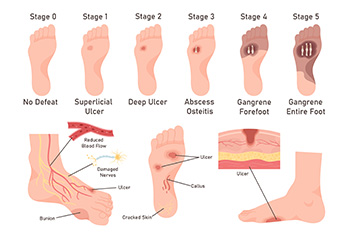
Foot ulcers are serious wounds that can develop for many reasons, and the right treatment depends on the underlying cause. Diabetic foot ulcers often occur due to nerve damage and pressure on certain areas of the foot. These require offloading with custom footwear, careful wound cleaning, and monitoring for infection. Arterial ulcers, which result from poor circulation, need blood flow to be improved through medical care while the wound is treated. Venous ulcers, often near the ankle, respond well to compression therapy and dressings that support healing. Pressure ulcers, caused by continuous stress on one spot, are managed with specialized shoes, cushions, or orthotics to relieve weight on the area. Because untreated ulcers can lead to serious complications, it is suggested that you promptly consult a podiatrist for a thorough diagnosis and a personalized treatment plan to protect your long-term health.
Wound care is an important part in dealing with diabetes. If you have diabetes and a foot wound or would like more information about wound care for diabetics, consult with Brock Liden, DPM from Ohio. Our doctor will assess your condition and provide you with quality foot and ankle treatment.
What Is Wound Care?
Wound care is the practice of taking proper care of a wound. This can range from the smallest to the largest of wounds. While everyone can benefit from proper wound care, it is much more important for diabetics. Diabetics often suffer from poor blood circulation which causes wounds to heal much slower than they would in a non-diabetic.
What Is the Importance of Wound Care?
While it may not seem apparent with small ulcers on the foot, for diabetics, any size ulcer can become infected. Diabetics often also suffer from neuropathy, or nerve loss. This means they might not even feel when they have an ulcer on their foot. If the wound becomes severely infected, amputation may be necessary. Therefore, it is of the upmost importance to properly care for any and all foot wounds.
How to Care for Wounds
The best way to care for foot wounds is to prevent them. For diabetics, this means daily inspections of the feet for any signs of abnormalities or ulcers. It is also recommended to see a podiatrist several times a year for a foot inspection. If you do have an ulcer, run the wound under water to clear dirt from the wound; then apply antibiotic ointment to the wound and cover with a bandage. Bandages should be changed daily and keeping pressure off the wound is smart. It is advised to see a podiatrist, who can keep an eye on it.
If you have any questions please contact our office located in Circleville, OH . We offer the newest diagnostic and treatment technologies for all your foot and ankle needs.
